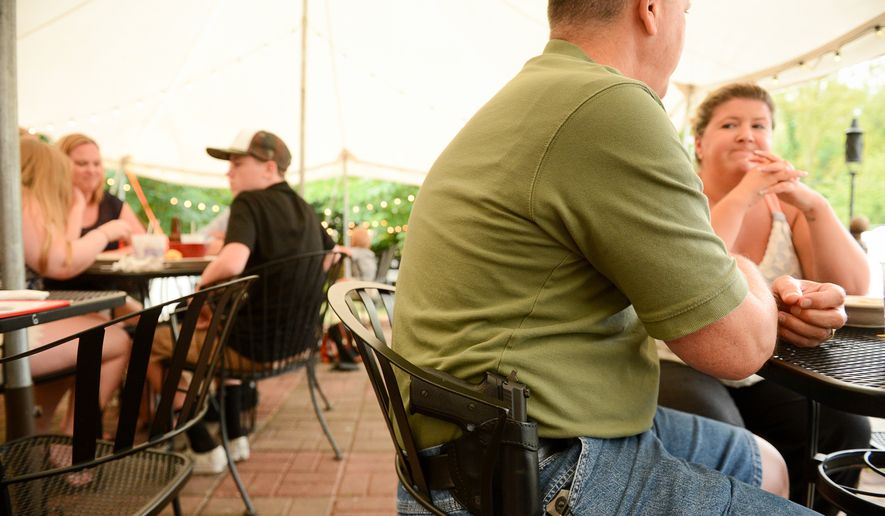People who have a “good reason” to feel threatened — for example, stalking victims — would be able to seek a concealed carry permit for a legally owned handgun under a new D.C. law proposed Thursday. But those with generalized fears, such as apprehension about living in a neighborhood with high crime, would not be considered eligible for such a permit, officials say.
The distinction is an aspect of legislation being grudgingly crafted by D.C. officials in response to a federal court decision that in July struck down the city’s longstanding ban on carrying guns in public.
Among the requirements for gun owners to obtain concealed carry permits under the proposed law, gun owners must justify their need for a permit and undertake new safety training. City laws would continue to restrict the carrying of firearms in certain “sensitive locations” such as government buildings, bars, schools and at public demonstrations.
When questioned about the proposal at a press conference Wednesday, officials defended the city’s approach.
“Living in a high-crime area is not sufficient to establish the good cause,” Attorney General Irvin B. Nathan said. “Getting death threats, being the victim of domestic violence and having the threats or reoccurrence, that would be good cause. It has to be personalized. It has to be something specific.”
Mr. Nathan said the city modeled its “may issue” approach to permits, which is virtually certain to face a lawsuit, on states such as New York and Maryland, where such statutes have withstood challenges in federal courts. But a similar requirement in California stating that a person seeking the permit prove they were confronted with a “clear and present danger” was struck in February. That ruling is on hold pending appeals.
PHOTOS: Best concealed carry handguns
The Supreme Court has declined to take up the issue of whether governments can restrict concealed carry permits only to those who demonstrate a justification for them.
Lawmakers in the District were open about their ambivalence toward the statute, noting that the legislation is only meant to bring the city in compliance with the federal court’s ruling, which is on hold until Oct. 22 to give the city time to draft new regulations.
“It’s my view that the District needs less guns, not more guns,” D.C. Mayor Vincent C. Gray said, mentioning last year’s mass shooting at the Washington Navy Yard as an example of the need for stricter gun laws.
The D.C. police chief would grant the city’s concealed carry permits under the law. Mr. Nathan said the city’s “may issue” stance dates back to a law enacted by Congress in 1931 that granted the police chief authority to issue such permits. The Metropolitan Police Department is already tasked with overseeing the gun registry process, which requires gun owners to complete a safety course, be fingerprinted and photographed and for the firearm to be reregistered every three years.
D.C. Police Chief Cathy L. Lanier said Wednesday she is comfortable deciding who should or should not be granted the right to carry a firearm but declined to give her own opinion on whether residents should be allowed to do so.
“As a reviewer, my job is to make sure you’re in the compliance of the law,” Chief Lanier said. “There is no opinion in the law.”
While the department will make the initial decision on a permit, a five-member Concealed Pistol Licensing Review Board will be appointed by the mayor to review any permit denials or license revocations.
“If there is a gray area, and somebody feels that they meet this criteria, and the chief has been unreasonable, then the appeals board would look at that,” D.C. Council Chairman Phil Mendelson said.
Other requirements for a person to qualify for a concealed carry permit include registration of the gun with the police department, 16 hours of safety training and two hours of range training, as well as a determination that the person has not suffered from a mental illness or condition that puts them at risk of being a danger to others. Open carry would not be permitted.
Gun owners from other states could apply for concealed carry permits in the District but would have to meet the same requirements.
The law would also bar the carrying of firearms in “sensitive locations,” including within 1,000 feet of the movement of dignitaries or public demonstrations. The provision raised the comical question of whether licensed gun owners should flee from dignitaries’ motorcades in order to stay in compliance with the law.
“The police would have to give notice,” Mr. Mendelson said, noting that criminal penalties could only be applied when police inform people they are violating the concealed carry law and they fail to comply.
Alan Gura, an attorney for plaintiffs in the lawsuit, told The Associated Press that the proposal did not comply with the judge’s order.
“In America, the police don’t determine what rights we have good reason to enjoy,” Mr. Gura said. “You don’t need a good reason to speak, to worship, to vote or to carry a gun for self-defense.”
Approximately 3,000 residents have registered handguns since the city’s near-total ban on gun ownership was overturned in 2008. Mr. Mendelson said he expects somewhere in the realm of “hundreds” of people might be able to get concealed carry permits under the proposed law.
“It’s not going to be a large number, and it’s not going to be soon,” he said.
• Andrea Noble can be reached at anoble@washingtontimes.com.




Please read our comment policy before commenting.